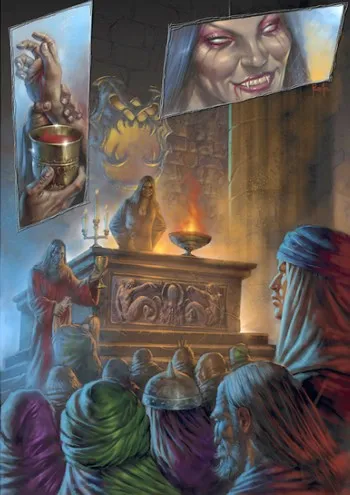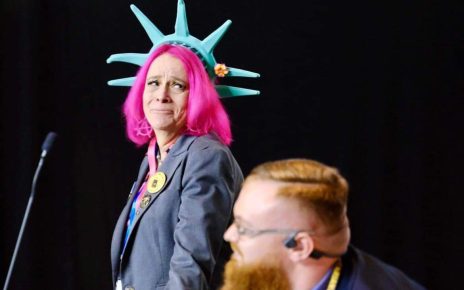Every crisis becomes a religion.
It’s inevitable.
Especially if it lasts long enough.
One factor in that transformation is the “Beautiful Theory” phenomenon.
This is the phenomenon where those who sell news team up with those who seek to lead others and insist some remedy is urgently needed and politically correct — so it MUST work, even if the actual evidence shows it obviously does not.
When Beautiful Theories crash into hard, cold reality, religion takes over.
And FAITH is the glue used to put a precious idea back together.
The advocates of Beautiful Theories need militant faith: these are true believers eager to crush doubt and compel obedience by making war on anyone seeking to show reality conflicts with the narrative.
Those denying the Beautiful Theories are infidels; those who champion them are the Righteous.
Some are swept into the faith because they desperately crave a sense of control over the crisis.
They need to believe Something Can Be Done, and they’d rather invest their faith in debunked Beautiful Theories than have no faith at all.
Faith is a coin that demands to be spent.
Some crave social approval, and the purveyors of Beautiful Theories have immense political, economic, and cultural power to make their faith seem fashionable.
Adding fuel to the fire, virtue signaling has become a plague in modern society because the signals are pre-packaged and made very easy to transmit.
People craving attention, along with people trying to disassociate with the “infidels” and “heretics” will wildly attempt to virtue signal their way into acceptance.
“Look at me – I blindly believe the narrative.”
“I’m one of the good guys!”
“I’m not one of THEM! Look, I have a Facebook badge to prove I fit in with you all!”
Most of these sheep aren’t even hoping they can assert control over a crisis by converting to the established religion. They settle for just having some MEANING, some simplicity…a sense that the righteous will fare better than the unbelievers—that virtue will be rewarded while sin is punished.
For example, that’s all a very common impulse with the Church of Covid, since the Beautiful Theories were so very obviously wrong.
There isn’t much left of the faith except the visceral communal satisfaction of hoping unbelievers will be punished for their blasphemies with sickness and death.
This sort of reaction happens with all of the crisis religions, although not usually as quickly and obviously as with the Church of Covid.
The last resort of every crisis religion, and the last thing that puts asses in the pews, is that addiction to ‘misery porn’: the collective hope that unbelievers will suffer someday, and everyone will admit the True Faith was right all along as Judgment Day crashes down upon them.
The elite will never have the humility to admit they were wrong.
They will never revisit their policies or examine the data.
Data and scientific study is the enemy to a crisis religion.
“The data isn’t important”
“What matters is we do what’s right.”
“Be responsible. Be mature.”
“I don’t care what the data says.”
These will be accurate sentiments from the church of the faithful.
Blind faith is far, far preferred to an objective practitioner.
And the leaders of the religion will never give up on politically or financially profitable “solutions” even when they obviously don’t solve the problem.
Founding a crisis religion means those who peddle “solutions” never have to say they’re sorry after their solutions fail—and certainly not even when their “solutions” cause more ruin and devastation than the crisis they were attempting to fix.
This certainly also applies to some very longstanding crises, like the “War on Terror,” the “War on Drugs” or the “War on Poverty”, whose nostrums long ago transformed into fantastically expensive articles of religious faith even as mountains of data accumulated that proved they were utter failures, and often made the problems far, far worse.
You can easily look for some telltale signs of a crisis transforming into a religion.
The most obvious one is when the high priests tell you the “war” you’ve been drafted into will never end.
They become very angry when asked to define success or failure, or lay out exit strategies.
Watch for the moment when you’re told “science” means not asking questions, defying dogma, or challenging “consensus.”
Remember: thst is the literal definition of faith, not science.
Always keep an eye out for Moving Goalposts, which are the signature miracle of crisis religions: their version of parting the waters or loaves and fishes.
Crisis religions work very hard to make their faith unfalsifiable by constantly changing the standards of evidence.
Check to see if certain people are accumulating huge amounts of money and power from a crisis.
That’s a pretty good sign it’s turning into a religion.
A crisis should be solved as quickly and efficiently as possible. Don’t let it fester long enough to become a special interest.
Above all, look for the whiff of arrogance to develop around a crisis.
Wise religions and effective crisis managers have something in common: a sense of humility.
Crisis religions are militant faiths that quickly become arrogant, smug, and totalitarian.
Dedicated people who truly want to solve a problem will look for evidence their analysis is wrong, or their policies aren’t working, and make adjustments as quickly as possible, no matter the cost or embarrassment to themselves.
This is humility. This is rational behavior in a crisis.
Crisis religions are arrogant.
They reject criticism, insist their Beautiful Theories must be right because they’re ideologically pure – they fit snugly into a worldview that must not be challenged.
Their plans only fail because their commands were disobeyed or sabotaged.
The high priests of a crisis religion see devils everywhere, leering at them from the rubble of every failure. Only sin can explain why their Beautiful Theories are tarnished.
Failure is never their fault, so it must be yours! They find your lack of faith disturbing.
And you know what? The saddest part is so many people simply WANT to see the world that way. They desire action. They demand “faith in doing” at any price. They hunger for the comfort of faith and the vibrant energy of militancy. They want to be right, and they want the wrong to suffer for their folly.
Atheists think religious faith in a god or religion is silly and terrifying, and wonder why so many embrace things without evidence.
However, the Principled and Truth-seekers similarly believe religious faith in the State is terrifying and wonder why so many embrace it.
The Answer: It’s because uncertainty is much more frightening.
A simple false story is better than a complex true one.
And with enough faith, maybe we can force the simple story to be true.



